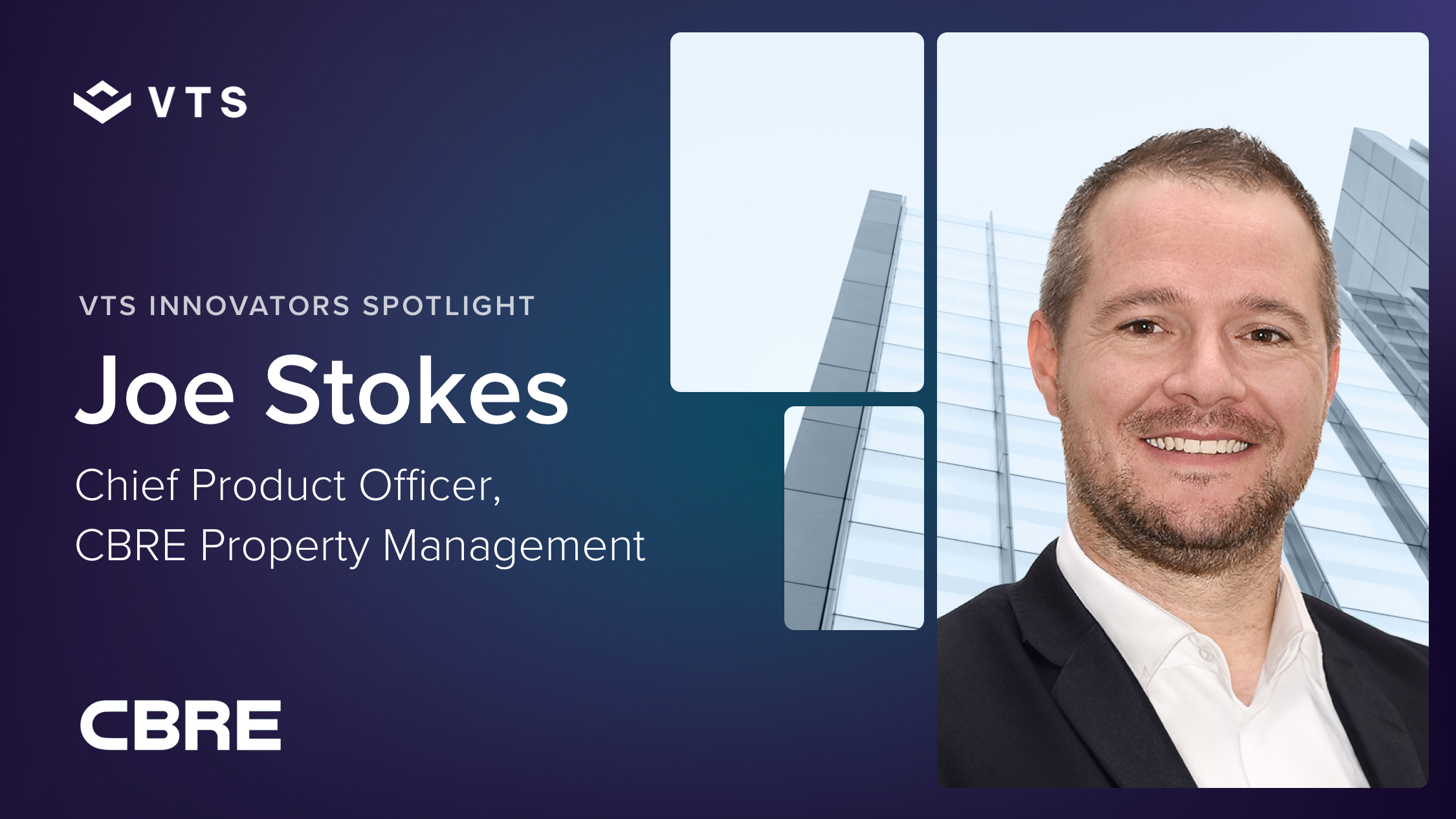In this VTS Innovators Spotlight, we spoke with Joe Stokes — Chief Product Officer of CBRE Property Management — about the CBRE and VTS partnership, the strategic product approach for CBRE, and the transformative role of technology in shaping the future of property management.
Thanks for taking the time to chat with us, Joe. We’re over a month into the new year, and it’s been a roaring start for CBRE. I'd like to first look back and then look forward.
The CBRE and VTS partnership was brand new at the beginning of 2023. What has surprised you most about the working relationship in the past year, and what momentum do you hope to carry forward in 2024?
I've known the VTS business and about the product and the services they provide. But I underestimated the depth, breadth, and knowledge of real estate that the team brings to the table, and the level of sophistication that the group has in the real estate sector.
I've been pleasantly surprised, and it’s allowed the partnership to move at speed because there's a joint understanding.
Your team comes at it from a technological perspective, solving problems for asset managers, property managers, and other stakeholders. We come at it from a very different angle, but it’s quite complementary. That's been really great.
One of the things I also appreciate with VTS is that it's about solving real-world problems and acknowledging that on the other side of technology you're understanding people and the role technology can play in their lives.
There's far too much in the real estate sector around PropTech and startup companies creating technologies in search of a problem to solve and a persona to fit that product. I don’t think that's the right way to go about things and be successful. VTS has a good handle on providing solutions for people - things like the VTS Lease product for asset managers and the leasing community; likewise on the tenant experience side, with property managers and the end users (the occupants of the building) with Host powered by VTS.
That's awesome. You mentioned coming at things from a different angle. As Chief Product Officer of CBRE Property Management, you oversee several different client solutions, including our partnership with Host powered by VTS. How would you describe the product strategy for CBRE PM? And what customer outcomes are you most focused on?
The strategy is about bringing more discipline and product thinking to the way we go to market and how we have conversations with our clients (and our clients' clients) as a real estate company. From a technology perspective , we’ve developed that muscle over time by productizing how we speak about a certain solution, what value it adds, and what problem it solves.
The success metrics depend on the customer. Metrics for the investor landlord will look different than the success metrics for their customer – which is the tenant – and the occupier’s customers, which are the employees, and the people working in the building. Then there are other customers like retailers, vendors, contractors, and suppliers.
Sentiment, satisfaction, and engagement are some overarching metrics for all customers. If you have engaged employees, employers, clients, and vendors, that is a far better place to start a conversation from. Making sure all of those stakeholders are satisfied is a great metric to measure and champion. There are tons of other metrics that we're often looking at, including operational efficiency, time and cost, driving income, retention, occupancy, and all the standard metrics that the real estate sector focuses on.
Sentiment and engagement are critical. From a product perspective, it’s about looking at not just product solutions, but also service solutions. How do we provide better customer experience for those employees and employers within the buildings? Whether that's a concierge offering or a community management offering, all the way through to the way we change light bulbs and keep the toilets flushing.
It’s that end-to-end aggregation of all the touch points; from a product perspective, we’re thinking about how we take our services and position them to the stakeholders.
Leveraging Deepki, VTS, and Industrious partnerships are key value-adds to the CBRE PM strategy. How do you see your partnerships with VTS and the aforementioned as complementary to the end customer, particularly the landlord?
Those strategic partnerships are not by accident. They are amplifiers of the CBRE services and platform. They’re a hugely valuable part of our ecosystem.
We're all living and breathing the evolution of work and the concepts of worker, work, and workplace. With that, we can't solve all the problems alone. Strategic partnerships enable us to amplify our capabilities with deeper expertise in certain areas.
Deepki as a partner enables us to provide greater flexibility and information around ESG, particularly around the sustainability and environmental metrics that matter for landlords and investors. It’s important that we're equipping our clients with that information, and Deepki plays that role.
Industrious comes from a flexibility perspective: this trend of working from anywhere. It allows our clients to provide that service to their customers, which are the employers and employees within the buildings.
The VTS partnership is one from a technology perspective - providing accessibility and amplifying the property management services on-premise.
You've been in property operations and tenant experience a long time. You mentioned the workplace is evolving. What do you believe makes a timelessly positive experience both for office operators and tenants? And the follow-on question is - where does technology fit in augmenting those experiences?
It's always about people. It's the human element.
When we speak about people, it's about being able to positively impact their feelings. For example, reducing someone's panic or anxiety because they're attending an important interview, pitch, or meeting. it’s really important for them to have a seamless experience as they go through the building to get to that meeting.
It's a feeling of safety from being in a secure building and not feeling threatened. It's about influencing a person's feelings when they’re walking into a building and are welcomed by a community manager or concierge. It's warm. There's a scent. There might be a sound. All those sorts of feelings.
To me, what makes a timeless experience is shaping people’s feelings in a positive manner, remembering that humans are humans. We evolve over time, but that evolution is slow, and we don’t see much of it in our lifetimes. We have a basic human nature of needs we hope to be met.
The way technology augments our lives is crucial to consider. Ultimately, it plays an enabling role in shaping people’s emotions. To use that earlier example of someone coming in for an interview, technology can facilitate and streamline visitor management check-in and the access control experience -- whether that be through the car park, the base building, or at the tenancy level.
We need to think about technology as augmenting. It's ancillary and it is about amplifying those physical, environmental, and social aspects of experience on the ground and providing better access to it. Technology plays a huge role, but I think it is a tool in a vehicle that needs to be used and put to work in the appropriate way.
How do you see the role of the property manager evolving? Assuming increased use of technology is part of that evolution, how do you think managing and using technology will impact the property manager's ability to cater to tenants at an interpersonal, human level?
Technology definitely has a huge role to play in the evolution of the property manager. I see the property manager more as a relationship manager and an account manager going forward.
Today’s technologies can certainly streamline and help efficiently manage the building operations. The belt and buckles, the boilers, and all those sorts of things.
But the property manager is going to be called upon more frequently to own the relationship with the occupiers of the building, the tenant reps, the companies, their employee base, and other stakeholders within that ecosystem. Having greater relationship management and account management capabilities is going to be the first area of evolution we'll see in property management.
The second evolution will be the ability to leverage technologies to drive greater experiences, efficiencies, and outcomes.
Third, more and more we'll see property managers front-of-house, pounding the pavement and having conversations with the occupants of the building. Almost like a human CRM capability, where technology plays a role in enabling all of those things. Everyone talks about the "hotelification" of corporate commercial real estate; it's that “guest relations'' person that is front-of-house that makes that possible. Whereas, historically, property managers have been more geared toward back-of-house.
That makes a lot of sense. When CBRE and VTS first announced their partnership, I recall the part of the partnership vision being geared toward delivering a new standard service to owners by connecting property management front-of-house with leasing. From your perspective, how is the role of property manager strategic to driving leasing outcomes?
It comes back to the human element and feelings. It's about relationship management. All of that is front and center to why people stay in a building and choose that as the home for their business. The property manager has a huge role to play in driving those feelings.
The connectivity between property management and leasing is absolutely imperative and instrumental in creating that ecosystem. I often talk about "hype" and "hygiene" factors within buildings. The hygiene factors are things like - do the lifts work, is the temperature set at the right level, are the lights on, are the bathrooms clean?
Then there are the hype factors. People often refer to the amenitization of the workplace: gyms, hyperbaric chambers, oxygen bars; all these things are just hype factors. If you don't get the hygiene factors right, it doesn't matter how many hype factors you have.
At the end of the day, it comes back to feelings. If I have to wait five minutes for my lift, I'm feeling frustrated. And if I can't get into the building quickly and easily, I'm potentially panicking and feeling anxious.
So you have to get the hygiene factors right. If we don't get those right, we don't have the license to upsell those hype factors that brokerage and leasing can sell as part of a pitch.
The launching-off point needs to be grounded in the hygiene factors. That comes back to the tenant sentiment, (all of those feelings), and how engaged they feel with the building as a result of those hygiene factors.
It’s the role of the property manager, the engineer, and the facilities manager to then communicate these things to the leasing team. Leasing can then catapult off that baseline because they know that the hygiene factors are being dealt with and managed, and are fully abreast of the real issues of the tenant and their sentiment towards the building's daily performance.
When the leasing team can access the management team's information and performance data, they can have a fuller and richer conversation and manage things like vacancies and upcoming expiries far better.
That's an awesome answer. To your broadest point, Joe, we’ve seen in our data that great “hygiene” is super important to tenants, possibly more so than “hype”.
Yeah. I bet. You asked about what the product strategy is for CBRE PM. The product strategy for us, in a sense, is – how do we make it sexy to talk about the hygiene factors? How do we bundle that up to show that there's genuine value in delivering those services as much as they may be expected? The reality is they're not delivered consistently to the level that people expect.
There's too much noise around the hype factors. People want the basics taken care of, and we've got to deliver on that. That's absolutely at the heart of driving better experiences.






